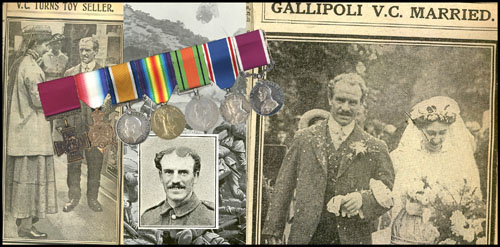
On 21 July 2005, Spink will
offered a Victoria Cross Medal Group awarded to Sergeant Alfred Joseph
Richards
which is expected to fetch in
excess of £150,000. One of the famous "six VC's before
breakfast,"
won by the Lancashire Fusiliers for the landings on W Beach on the
Turkish Peninsula of Gallipoli,
the Cross reflects a great story of bravery during a campaign that
was ill-fated from the start.
Sergeant Richards, along with the 1,028 Lancashire Fusiliers, approached
the shores of the Gallipoli Peninsula
just before 4am on 25th April, 1915. Onethousand defending Turks were
aware of the approaching boats and
had strict orders not to open fire until the enemy was 100 metres
away, therefore
displaying none of their defence plans. The trenches and wire on the
beach temporarily sat unscathed
and the waters around the beaches remained calm and smooth.
Just before the first boat grounded, the shooting from the hills began.
The wire captured many men who would never escape from its embrace.
A brutal battle commenced and the hail of fire from the Turkish position
inflicted over
500 casualties of the 950 officers and men. A few survivors, including
Sergeant Richards,
managed to overcome the wires and machine guns to secure the beach
for further landings.
The troops that followed the Lancashire Fusiliers were shocked at
the sight of dead and
severely wounded bodies strung along the wires and sandy beaches upon
the shore.
One Army Chaplain recorded "One hundred corpses lay in rows in
the sand,
some of them so badly mauled as to be beyond recognition. All over
the strip of sand, and on ledges of rock,
wherever any cover could be got, men lay about wounded, cut, bleeding
and dying."
A month after sustaining his horrendous wounds on the peninsula, surgeons
in Egypt amputated Richards'
right leg above the knee. Evacuated to England, he was discharged
from the Army on 31 July 1915.
He had served twenty years and six days with the Colours, all of that
time with the Lancashire Fusiliers,
and had been awarded the Long Service and Good Conduct Medal.
He was living at the Princess Christian Soldiers' and Sailors' Home
in Woking when he first received news
that he was to receive a Victoria Cross. Of his award he said, "I
am proud to learn that my comrades chose me
as one of three of the bravest, but we all did our duty even though
luck may have helped some to more noticeable acts.
I don't know how the vote was taken, but had it been a comrade selected
instead of myself I should feel just as proud."
Many newspapers referred to him as the "Lonely VC." Both
his parents had relocated to Australia and his two brothers
were serving with the Anzacs. One newspaper account stated "Outside
the regimental circle he has no friends in the world,
no relatives to welcome him home, no townsmen to do him honour, though
any city might be proud of him."
This "Lonely VC" would not retain the name for long. A year
after he received his Cross at Buckingham Palace
he married Miss Dora Coombs at Weybridge on 30 September 1916.
They had met while he was recovering from his wounds at a nearby hospital.
He later went on to work in the Lord Roberts Memorial Workshop making
toys for children.
One reporter wrote of the establishment "Before you get through
the waiting room you can hear
the men singing at their work - one-armed Tommies cutting out toy
patterns and jig-saw puzzles…
one-legged Jack Tars deftly engaged in basketwork, and heroes of both
Services assembling parts of forts,
men-of-war, field guns, villages, farmyards, and those "Caran
Rouge" series of jointed animals
which just now are having such a vogue".
Sergeant Richards was born on 21 June 1879, into a military family;
his father had served twenty-one years
with the 2nd Battalion, rising to the rank of Colour Sergeant. On
6 July 1895, he followed his father's lead and joined
the Lancashire Fusiliers as a Band Boy. He served with 1st Battalion
in Ireland and was soon appointed a full Drummer.
He reserved in England, Egypt, Crete and Gibraltar. During these years
Richards gained a reputation
as one of the battalion's best footballers and helped his team win
the Gibraltar Garrison Cup in 1904.
When the battalion returned to England in 1907, Richards, at the end
of his period of engagement,
took his discharge. He was still a Lance Corporal. Two months later
he re-enlisted and was sent with a
draft back to his old battalion, then stationed in India. He remained
there, serving at a variety of Army stations,
until the outbreak of war. By then he was a Sergeant serving in C
Company, and it was with this
company that he set sail with the HMS Euryalus for the landing on
W Beach.
Alfred Richards died at home on 21 May 1953, after a short illness.
He was seventy-three.
Spink's sold
the medal for £110,000

